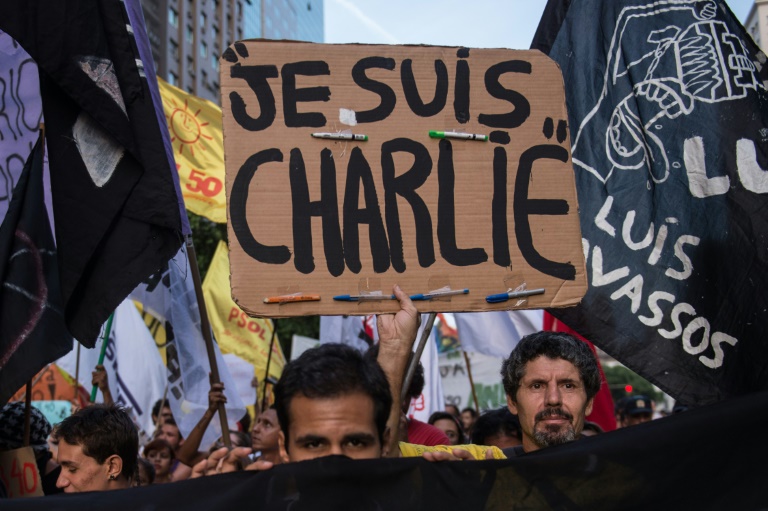
Paris (AFP) - A Paris court was set Wednesday to issue its verdict in the trial of 14 suspected accomplices of the Islamist gunmen who murdered some of France's most famous cartoonists at satirical weekly Charlie Hebdo in 2015, killings that horrified the nation.
Seventeen people were killed over three days of attacks in January 2015, beginning with the massacre of 12 people at the magazine, which had published cartoons of the Prophet Mohammed.
That attack was followed by the murder of a French policewoman and the hostage-taking at the Hyper Cacher market in which four Jewish men were killed.
The massacres, which signalled the start of a wave of Islamist attacks around Europe, triggered a global outpouring of solidarity with France under the "I am Charlie" slogan.
All three assailants were killed in shootouts with the police in the wake of the attacks, leaving only accomplices to face trial.
Those on trial are accused of assisting brothers Said and Cherif Kouachi, who carried out the Charlie Hebdo massacre, and their accomplice, the supermarket hostage-taker Amedy Coulibaly.
Over three months long, the trial was repeatedly held up due to the Covid-19 pandemic but has again highlighted the horror of the attacks, during a period when France has again faced killings blamed on Islamist radicals.
The verdict is due to be read from 1500 GMT.
'Never be erased'
On the cover of its new issue to mark the verdicts, Charlie Hebdo in typically provocative style published a picture of God being led away in a police van with the title "God put in his place".
"The cycle of violence, which had began in the offices of Charlie Hebdo, will finally be closed," its editor-in-chief Laurent "Riss" Sourisseau, who was badly injured in the attacks, wrote in an editorial.
"At least from the perspective of criminal law, because from a human one, the consequences will never be erased, as the testimony of the victims at the trial showed," Riss added.
Anti-terrorism prosecutors are seeking jail terms ranging from five years to life imprisonment for the accused.
Defence lawyers have slammed the prosecution's case as thin on evidence and warned against making examples of the accused to compensate for the fact that the killers themselves cannot be tried.
The court needs to show "exemplary, not bloodthirsty" justice, said defence lawyer Zoe Royaux.
Prosecutors are seeking a life sentence for Ali Riza Polat, a 35-year-old French-Turkish friend of Coulibaly, whom they presented as his "right-hand man".He denied any knowledge of a terrorist plot.
Also facing a life sentence is Coulibaly's girlfriend Hayat Boumeddiene, who fled to Syria shortly after the attacks and was one of three tried in absentia.
Riss acknowledged in his editorial that there had been "great difficulty" in establishing the criminal responsibility of the accused in the hearings, while adding the trial was "first and foremost that of this political terror which one calls Islamism".
'Deathly silence'
The Kouachi brothers claimed they were acting on behalf of Al-Qaeda while Coulibaly had sworn loyalty to the Islamic State group.
Columnist Sigolene Vinson, who survived the Charlie Hebdo massacre, told the court of the "deathly silence" in the office as her colleagues lay dead all around her.
Former Hyper Cacher cashier Zarie Sibony described stepping over bodies in the aisles of the supermarket during Coulibaly's four-hour standoff with police.
Those killed in the Charlie Hebdo attack included some of France's most celebrated cartoonists such as Jean Cabut, known as Cabu, 76, Georges Wolinski, 80, and Stephane "Charb" Charbonnier, 47.
To mark the start of the trial on September 2, Charlie Hebdo defiantly republished the cartoons of the prophet that had angered Muslims.
Three weeks later, a Pakistani man wounded two people outside the magazine's former offices, hacking at them with a cleaver.
On October 16, a young Chechen refugee beheaded teacher Samuel Paty who had showed some of the caricatures to his pupils.
And on October 29, three people were killed when a young Tunisian recently arrived in Europe went on a stabbing spree in a church in the Mediterranean city of Nice.
President Emmanuel Macron's government has introduced legislation to tackle radical Islamist activity in France, a bill that has stirred anger in some Muslim countries.







